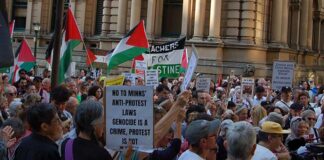The National Labor Conference was designed to position Labor to return to government, in time for the election due by the end of next year.
But it only confirmed Labor’s drift to the right.
Leader Bill Shorten confirmed the party’s agreement with the Liberals over the need for cuts to balance the budget, promising that he “understands fiscal responsibility” and would be “prepared to make hard choices”. He simply believes Labor cuts would be “fair savings”.
Shorten attacked Abbott from the right for doubling the budget deficit and damaging business “confidence”. He repeated the neo-liberal mantra of “productivity, growth and jobs”, while assuring business that “Modern Labor believes in the operation of markets, in competition and profits.”
So there was little serious talk of taxing corporations or the rich to pay for decent spending on schools, hospitals and services.
The sole measure floated was the “Buffett rule”, to force anyone earning over $300,000 to pay a minimum 35 per cent tax. The Australia Institute estimates this could raise $2.5 billion a year.
But there was no commitment to abolish or even reduce the use of negative gearing on investments, which Labor has also flirted with.
Equal marriage
Bill Shorten also derailed the push to bind Labor MPs to support same-sex marriage.
He struck a compromise where the party will still allow its MPs a conscience vote until 2019, beyond the next two elections. This means bigots within the Labor caucus can continue to vote against equal marriage rights, making it less likely a bill would pass.
Shorten tried to position himself as a supporter of marriage equality by promising to introduce a new bill within 100 days should Labor win the next election.
Shorten’s two big triumphs of the conference were to stare down the left over refugee boat turnbacks and same-sex marriage.
All he has done is confirm Labor’s determination to race Tony Abbott to the right. That means Labor’s crisis will continue—and Abbott is still in with a chance.





